The daily advances in IT mean a vast amount of data will soon be harvested from farms – some of it worth a lot of money. The IFA is now investigating whether a co-op data model could be established to put Irish farmers in control of this data and in a position to reap any benefits.
Farmers readily understand the suggestion of a co-op. But most will be mystified as to what this data is and how it could be valuable. IFA’s head of IT Ethan Cleary explains.
“Increasingly, the machinery or other equipment bought by farmers and contractors are recording information about the work carried out and other conditions on the farm,” he says. “This can be the case with tractors, milking machines, diet feeders or combines. Likewise, where services are provided to farmers, it is now normal for a lot of data to be collected – anything from herd health to milk quality or crop yield.”
This data will be put to many uses – many of which we haven’t thought of yet. At the most basic it can be identifying farmers for targeted marketing of goods and services. But what if the information collected on a farm by a machine or as part of a service is accessed by a food processor or big retailer? It could influence the price a farmer is paid for his milk, meat or crop or what level of subsidy he is paid or the price of farmland.
Some data will be collected for better running and management of the farm. But if the farmer decides to switch over to a rival service provider will he be able to bring the data of the past few years with him?
“We’re only at the start of this,” Cleary says. “Advances in IT and lowering of costs of the technology means that collection of data on farms is already taking off. Data will be a new currency. In 2015, $4.6bn was invested globally in agri technology related to data collection – more than was invested in medical or financial or green technology.”
He represents IFA on COPA/COGECA’s agri-technology taskforce. “We’re looking at how this technology will impact on farmers. Key areas include ownership of rights to data; the need for interoperability and standardisation – to benefit farmers – and giving farmers protection under law and entitlement to privacy and encryption.”










SHARING OPTIONS